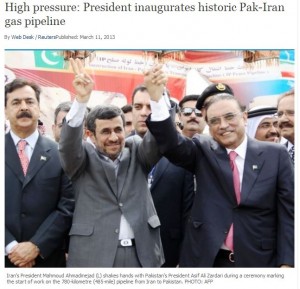More Signs Iran May Want Nuclear Agreement
When Hassan Rouhani scored such a decisive and surprising victory in Iran’s elections, many took this as a sign that the hard-liner positions of Amadinejad were ending and that a new, more moderate position for the country would emerge. Iran-watching is of course made difficult by the complex relationship between the civilian and religious sides of the government, but additional signs are now emerging both that Rouhani is indeed maneuvering toward a friendlier negotiation stance and even that some of the moves toward moderation began before the election was held and are therefore not just moves by Rouhani.
In today’s New York Times, we see further support for the suggestion that came out earlier in the week that Iran is likely to name new Foreign Minister Mohammad Javad Zarif as the chief negotiator in talks regarding Iran’s nuclear technology:
Mr. Rouhani’s choice for foreign minister, Mohammad Javad Zarif, was confirmed by Parliament last week. The signals that Mr. Zarif would lead the nuclear negotiations were conveyed on Tuesday at a regular weekly news conference in Tehran by the Foreign Ministry spokesman, which was broadcast by Iran’s Press TV Web site.
“Over the past 10 to 12 years, the negotiator has been the secretary of the Supreme National Security Council. This may change,” said the spokesman, Abbas Araqchi. “Rouhani may decide to appoint somebody else. Maybe the foreign minister, or anyone else that he deems fit.”
For the spokesman to even make such a speculative statement suggested that Mr. Rouhani had already decided that his foreign minister would be doing the negotiating henceforth and that Iran’s supreme leader, Ayatollah Ali Khamenei, who has the final word on the nuclear issue, had agreed, despite his own deep mistrust of the West.
There has been some minor push-back on the speculation about Zarif, but this appears to be aimed more at the fact that an official announcement has not yet been made than the idea of Zarif taking the lead in negotiations:
In similar remarks on Tuesday, Iranian Foreign Ministry Spokesman Seyed Abbas Araqchi also rejected the AP report which alleged that Zarif would be leading the negotiations with the G5+1, saying, “No decision has yet been adopted in this regard.”
Araqchi said the foreign ministry and other related bodies are “waiting for President Rouhani to choose the country’s chief negotiator”, and added, “Whenever he specifies the negotiating chief and team, the next step will be specifying the time of the negotiations.”
After getting that “denial” out of the way, however, the article goes on to report on discussions already held between Zarif and the chief EU negotiator Catherine Ashton, but with Ashton identified as EU’s “foreign policy chief”, so that the conversation is merely foreign minister to foreign minister (emphasis added): Read more →

